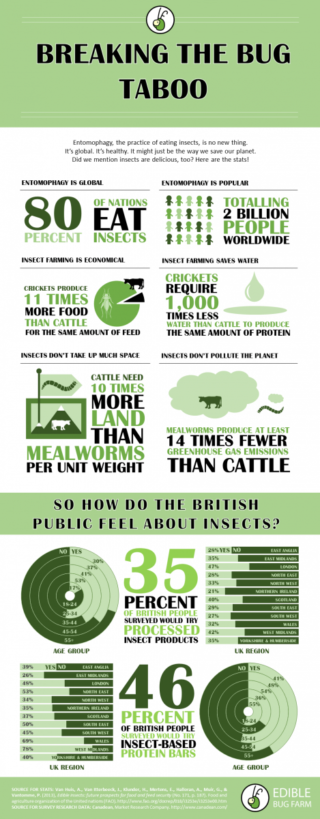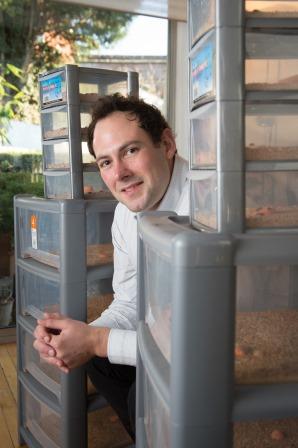Back in November 2015, Adam Routledge won the monthly Shell LiveWIRE Smarter Future award, which came with £5,000 in funding and expert workshops aimed at business development. He was subsequently selected as a finalist for the overall Shell LiveWIRE Young Entrepreneur of the Year Award 2015, competing against an extremely strong field of five other innovators addressing a range of sustainability-related issues.
Our CEO Jurga Zilinskiene is a former award winner in the same competition, and worked closely with Shell LiveWIRE as a judge for this year’s roster. In support of this year’s victor, we spoke to Adam about Edible Bug Farm’s mission and what the future might hold for him.
1. What is Edible Bug Farm, and what problems does it address?
Edible Bug Farm produces human grade edible insects using scientific management principles. We aim to be a leading expert and pioneer in the entomophagy industry, offering an alternative solution to the imminent global food security crisis facing the world today. The farming technologies we are developing are designed specifically for automation, cost-efficiency, sustainability, and scalability. Through our website and social media, we publish articles promoting the culinary variety, sustainability, and health benefits of edible insects.
2. What inspired you to develop your business?
My business partner, Matt Anderson, and I lived in Asia for a couple of years after we finished university, where we tried a lot of different kinds of edible insects. When we came back we started Edible Bug Farm as an online resource dedicated to promoting the sustainability and environmental benefits of insects. It was after we found out more about the UK market and the lack of a UK-based supplier that we shifted to focusing on the farming side of the industry and incorporated Edible Bug Farm as a business.
3. What traits do you think a successful entrepreneur needs to have?
I think a successful entrepreneur should look past get-rich-quick schemes and instead focus on what will make the most significant difference in the future. By focusing on the future it gives you time to really understand the industry you are entering and plan what you will do in detail. I think it is also important to be determined and have thick skin, as inevitably, you will face obstacles and set-backs which can be disheartening at times, but are crucial to overcome if you want to be successful.
4. Is there enough of a focus on sustainability amongst British innovators?
I think there is more of a drive towards sustainability amongst British innovators nowadays than there used to be. Focusing on sustainability can open up new opportunities which may have otherwise been out of the reach of the business model. Also, I think people generally are starting to see the importance of sustainability for our future as we can’t keep using resources and polluting the planet as we have done in the past – especially not with our growing population which is forecast to reach over 9.6 billion by 2050.

5. What goals do you have for your firm following Shell LiveWIRE?
We have two main goals at the moment. The first is to complete the development of our farming automation technology over the next year. We will then use this to set up a large industrial farm as efficiently as possible. In the meantime, since we have the breeding stock ready to go, our second goal will involve scaling up our domestic farm to a small R&D farm in the coming months.
6. Where do you see yourself and your brand in five years’ time?
In five years’ time we aim to be well established in the UK entomophagy industry with farms supplying both mealworms and crickets. We also hope to have set up a network of Edible Bug Farmers who focus on the highest quality standards, taste, nutrition and farming efficiency.
7. The idea clearly has global potential for transforming our attitudes to food. Do you envision launching it in foreign countries? If so, which ones would you prioritise?
We do envision launching abroad, mostly likely in Asia, which currently has the largest market for insects. Thailand and China are the two markets we would most likely prioritise. We have contacts in Thailand who have knowledge of the language and market, so are likely to enter Thailand first. For China, however, we will require outside support to help facilitate our entry.
8. What challenges do you think would come with launching in foreign markets?
I think the main challenge will be ensuring that our farms abroad adhere to the standards we have set here in the UK, and then making sure that people are aware of these high standards, despite farm location. We see a lot of potential for edible insects, but only if we ensure our product is produced to the highest food safety standards. Knowledge of local food legislation and practices will be a helpful starting point to overcome this. We will most likely have to make use of local expertise for translation purposes in order to get an accurate understanding of how things are currently done, and so that we can identify any training needs of overseas staff. Another challenge we will face is ensuring that the environmental impact of any exported goods is kept to an absolute minimum, since one of the main benefits of edible insects is their sustainability.
Check out the rest of the Today Translations News and Resources Section
Keep up to date with Adam’s progress and Edible Bug Farm’s development with the twitter handle @ediblebugfarm and their website http://www.ediblebugfarm.com/

